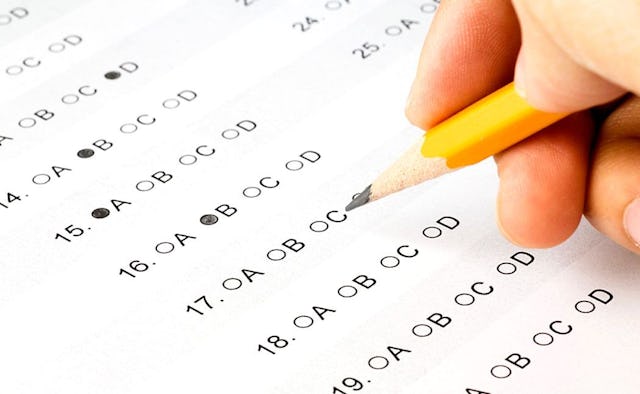Why I Opted My Son Out Of Standardized Testing

No, no. I kid.
The debate is calm now, but it raged fast and furious in April when testing time came. In my own community, where the opt-out rate was almost 15 percent, the range of views on both standardized testing’s effectiveness and the best way to handle the situation gave us a lot to think about. In the end, we decided our son wouldn’t take the tests.
But the discussion continues, and I can see that there are still people who don’t really understand why so many of us made that choice. One of them is Marika Heughins, a well-intentioned sixth-grade teacher in Connecticut, who wrote about why all kids should have to take the tests. She’s been teaching for 18 years and has a master’s degree in education, so she is coming from a place of expertise, which is why I’m surprised that she’s so wrong about the reasons behind the so-called “opt-out movement.”
Since she comes at it from a place of knowledge, it’s strange that she assumes that the reason people opted out is because our children don’t feel like taking the tests, or they think they are too stressful. That’s not why at all. I didn’t write to the school to exempt my son because he was stressed out about the test or because he doesn’t like tests. He doesn’t like homework, either, or brushing his teeth, or picking up after himself, but we make him do all of those things.
“Unfortunately, there is a frightening new sentiment in the education world these days that it is OK for students to pick and choose what they participate in,” Heughins writes. “We are sending a message to our children that if they do not like something or if it seems too difficult, then they do not have to do it.”
She’s missing the point.
Some of us think that standardized testing is not a way to identify a student’s strength and weaknesses, or a teacher’s effectiveness. In New York state, where we live, 557 principals signed a statement saying that they felt that the tests had ambiguous questions on them, and that they, along with teachers, couldn’t agree on the answers.
I’m not a fan of these tests, even though I have always been a good test-taker. When I decided to go to college in the United States, I had to take the SATs, something I hadn’t prepped for because we don’t have them in Canada. I bought a book of tests, took one, then checked all my answers. I took another test, checked those. I went through the book until I understood strategies for answering sooner, narrowing down the multiple-choice options, and deciphering the ambiguity and codes in so many of the questions. What I did, basically, was teach myself how to take the test. And I aced it, and got into the college I wanted to go to.
The tests my sixth-grader was supposed to take weren’t going to help him get into college, and weren’t going to serve any function for him at all. Since I object to this type of testing, I chose to send a message to the Department of Education by opting out. I knew that I wasn’t the only one in our school, and that that gave us potential to have some impact. If it was just my son, and him alone, I probably would have decided otherwise, since it wouldn’t have helped make a statement, and he would have been singled out in a way that didn’t serve him.
While the other students tested, my son and his fellow opt-outers were sent to the cafeteria to read quietly. He couldn’t use the time to do homework because they didn’t assign any during test weeks. He was bored in the cafeteria, but when he asked for permission to go to the diner with his friends instead, we said no. We did want to teach him something, but unlike what Heughins thinks, we weren’t teaching him to avoid things that are difficult or unpleasant. We were teaching him to stick by his principles, whether or not it was pleasant for him.
He has plenty of other opportunities to learn about perseverance, and hard work, and having to do things he doesn’t want to do. There were many of those before the tests came along, and there will be no shortage of them throughout his life.
When he came to us about the tests, he gave us the same arguments against taking them that we already knew. We were surprised and proud that he knew so much about it, so we backed him up, not all the way to the diner, but definitely to the cafeteria, despite the uncomfortable benches and the lack of something else to do.
And that is why we opted out. We didn’t want to teach him to back away from a challenge; instead, we taught him to stand up for something. I hope it’s a lesson that sticks.
This article was originally published on